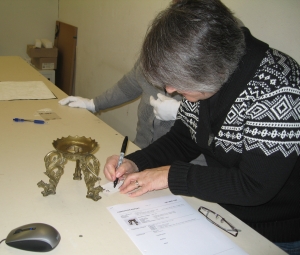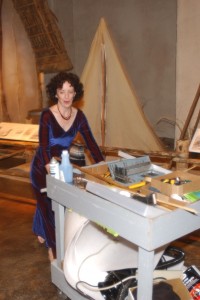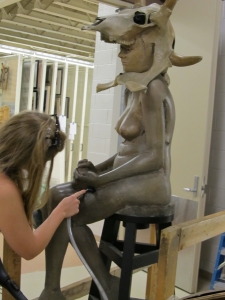Frequently Asked Questions
Is this blog only for registrars?
What does it take to be a registrar?
Do I need any special skills?
I want to be a registrar, how do I do this?
Are you an institution or something?
Why Registrar’s Trek? And why the next generation?
Is this blog only for registrars?

Registrar tagging a Bali artifact.
Thanks to Sharon Steckline for the picture.
No, it is for anybody who is interested in museum work behind the scenes and everybody who works in collection management.
The term “registrar” itself is not as clear as it seems. Taking the USA we have at least two terms that can describe the same or totally different jobs, depending on the museum: registrar and collection(s) manager. In some museums the registrar does only paperwork while the collection manager is responsible for the practical tasks. In other museums the collection manager will be the head and the registrar the assistant. Others go under the job title “collections manager and registrar”. Then again, there are museums with a curator of collections who carries out registrar’s work…
If this was not enough to confuse you: take a look at Germany. There we have: Registrar, Sammlungsmanager, Sammlungsverwalter, Depotverwalter, Magaziner, Museologe, Leihbüro, Archivar für Sammlungsgüter… I guess, I missed a few terms. All of them conduct more or less registrar’s work.
So take “registrar” as a term to gather them all together, no matter which job title is written in the contract: People who are responsible for the protection of our heritage, may it be natural, cultural, naturecultural. Or, to make it short in the words of a much respected colleague:
We Registrars/Curators of Collections have to stick together!
What does it take to be a registrar?
Well, there are many answers to these questions. Like always, this will depend of the kind of tasks you will have to perform in your museum. But, if we should name three skills it would be: detail-oriented, organized and diplomatic.
Detail-oriented because you will have to take care of loads of paperwork and because working with artifacts not only needs a calm hand but also an eye that gives attention to every little detail. Organized because that’s the core of your job. You will organize storage areas, packing, transports, time schedules, your colleagues, your own desk… well, you get the picture. Diplomatic because you will have to deal with people in all kinds of situations: you will have to explain to donors why you can’t accession an artifact, negotiate with the head of your institution about additional archival boxes, calm down upset lenders after something got damaged during transport, short: diplomacy and intuition are necessary for a registrar.

Last minute installation: The ability to be ready for the great opening and deliver a cart of desperately needed tools to the mount-maker at the same time.
Thanks to Lisa Kay Adam for the picture.
Oh yes, you do. As a registrar it is usual that you wear many hats. The cases where you will simply work as a registrar that is responsible for the collections or a certain part of the collection are limited to a few big museums. More common are the registrar’s jobs in small and middle museums. Here you might be needed as exhibition technician, proofreader, tour guide, visitor complaint manager, crate builder, facility manager and/or cashier – along with your daily routine as a registrar, that is. For some smaller museums run under a very tight budget you might even find yourself in the shoes of a curator – and therefore often of the only museum professional within miles.
Depending on the museum, there might be skills involved you never thought about. Some time ago the German job center explicitly mentioned in their job description that it might require to work on ladders… Well, little did they know that it might even require to work on this kind of equipment.
I want to be a registrar, how do I do this?

It’s a great job… but you might have to do things you never thought of before.
Thanks to Liz Fuhrman Bragg for the picture.
There are many ways to achieve this. The most straightforward way might be to study museum studies and specialize on collections management, but there are many other ways. It’s not our purpose to make suggestions about what to study or even less to recommend universities. But you might be interested in stories from people who became registrars:
- FAUX Real – How did I get here?
- How I became a Registrar IV
- How I became a museum registrar III
- How I became a museum registrar II
- How I became a museum registrar I
Are you an institution or something?
Nope, we are no institution, university, private museum studies course or something. Just two people, non-profit, non-commercial… and enthusiastic about the work done in museums in general and registrar’s work in particular. For we write and maintain the blog in our free time it might be that some content might be only available in one or two languges for a certain amount of time. So please, be patient with us, we try to keep up…
Why Registrar’s Trek? And why the next generation?
Well, remember Star Trek?
Space, the final frontier
these are the voyages of the star ship Enterprise
It’s five-year-mission:
To explore strange new worlds
To seek out new life and new civilizations
To boldly go where no man has gone before
Okay, registrars have been around for a long time. According to Museum Registration Methods, 5th Ed. (Washington, D.C.: The AAM Press, 2010) the first appearance of the term “registrar” in the USA dates back to 1881 and the job itself dates back much further. But in other countries the development of having a person called “registrar” on staff in a museum is rather new. So, in a way, we still can feel as pioneers who boldly go where no man has gone before.
When we set up this blog Fernando and I (Angela) discovered that we both loved Star Trek (which comes in incredibly handy to get concepts across language barriers) and we both have our parts in educating registrars-to-be. So the term “the next generation” is not only a reference to Star Trek but also a term to express our hopes that this blog will be a helpful – and entertaining – resource for young and emerging registrars.
Hola buenos días,quisiera poder saber si ustedes no han propuesto a realizar cursos de capacitacion a personas que trabajan en Museos y que realizan este tipo de trabajo que han sido puestos por que no hay mas personal, son funcionarios Publicos, cooperadores, etc.
En mi caso soy funcionario Municipal de la Municipalidad de osorno, Chile, estudie Tecnico en Bibliotecologia para bibliotecas privadas y publicas, Universidades publicas y privadas.Al llegar al Museo se me destino como encargado del deposito del Museo Histórico y me dieron la mision de clasificar catalogar y posterior registro de lñas colecciones que cuenta este Museo, que hay desde fosiles, telas, insectos ,coleecion mapuche, ceramica, artefactos antiguos de la epoca, cuadros de pintura,armas etc….. como vera tuve que adecuarme a lo que habia con un pequeño inventario que data de la creacion del Museo y actualizando las colecciones,ahora quisiera poder saber si ustedes pueden realizar algun curso para latinoamerica en este ambito que ustedes estan realizando para poder de esta manera ir aprendiendo nuevas tecnicas, nuevos sistemas , software etc. hay una entidad en españa , la corporacion iberoamerica de españa que relaiza curos para latinoamerica donde uno postula a estos cursos, mire le dejo esta pagina para ver si le interesa http://www.aecid.org.py/ desde ya muchas gracias.
claudio Lorca
funcionario encargado deposito